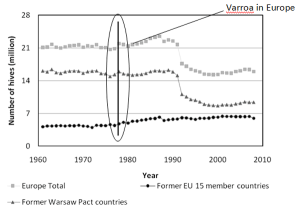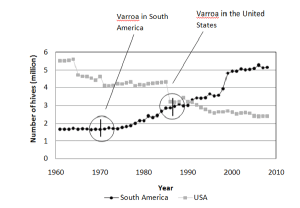Lawrence W. Reed
August 18, 2013
******************************
The idea pervades the bill that severe penalties will secure enforcement; but all experience shows that undue severity of laws defeats their execution … [N]o law can be sustained which goes beyond public feeling and sentiment. All experience shows that temperance, like other virtues, is not produced by lawmakers, but by the influences of education, morality and religion. Men may be persuaded—they cannot be compelled—to adopt habits of temperance.
—Horatio Seymour, 1854
This essay is about a long-forgotten New Yorker who served in his state’s legislature and twice as governor, then nearly became President of the United States. Much respected, even beloved by many in his day, his name was Horatio Seymour. He deserves to be dusted off and appreciated now, almost 130 years since his death. But first, some context.
The Democratic Party in the state of New York these days is about as “liberal” (in the twentieth-century, American sense of the term) as it gets. On economic issues in particular, it is reliably statist, meaning it rarely deviates from the “more government is the answer” mentality, no matter how strongly logic or evidence point elsewhere. But not so long ago, New York’s Democrats were largely of the opposite persuasion. They were often what we now would call “classical liberals,” ardent skeptics of the concentration of power. Classical liberals really believed in liberty; today’s liberals really don’t.
Local and national Democratic Party organizations today host “Jefferson-Jackson Day” dinners in honor of two of the party’s early representatives. If Thomas Jefferson or Andrew Jackson could stop in for a drink, it’s not likely that either one of them would recognize their party after all these years. Arguably, they’d be horrified enough to resign their memberships. My guess is that Jackson would become an Independent while Jefferson would bolt for the Libertarians.
New York City in the 1830s was the birthplace of the Locofocos, the most principled libertarians the Democratic Party ever produced. Their opposition to subsidies, high tariffs, special favors, fiat money, and interventionist government helped keep the state and national party on the right side of liberty until the silver-tongued currency crank William Jennings Bryan came along in 1896.
Martin Van Buren, Jackson’s successor, was a New York Democrat. Economist and historian Jeffrey Rogers Hummel argues that Van Buren may be the most libertarian of all the American presidents.
In the 1840s and 1850s, Democrats fought the Whigs, who stood for a Hamiltonian big government that would dispense privilege and corporate welfare, jack up tariffs, and centralize banking. When the Republicans picked up the mantle of the Whigs in the late 1850s, Democrats opposed them for the same reasons. With the exception of Horace Greeley, the most pro-liberty presidential candidates in the thirty years after the Civil War were the Democratic nominees who didn’t win (Seymour, Tilden, and Hancock). The only Democrat to actually capture the White House between 1865 and 1912—Grover Cleveland, born in New Jersey but a New Yorker most of his life and governor of the state—was arguably one of the very best and most pro-liberty presidents of the 44 we’ve had.
New York was home also to eight-term congressman Bourke Cockran, who emerged in the 1890s as one of the staunchest and most eloquent defenders of Jeffersonian liberty Americans ever sent to Washington from anywhere.
But something happened to the Democratic Party in the years between Cleveland and the next Democratic president, Woodrow Wilson—my personal choice for the worst of all presidents. That sad turn of events is a story for another day. Allow me now to return to my primary subject, Horatio Seymour.
Seymour wrote those words at the top of this essay. They were part of his 1854 veto of one of the earliest alcohol prohibition measures that made it to a governor’s desk. If the wisdom of that veto message had been heeded 65 years later, America would have been spared the imbecility of Prohibition. So, too, it could have saved us from compounding that destructive error with a futile, expensive, and tyrannical War on Drugs in more recent decades. His view on Prohibition was indicative of his general perspective on the role of government in our lives. He was no friend of the meddlesome nanny state.
Seymour was born in 1810 in Onondaga County, New York, early in the presidency of another Jeffersonian Democrat (from Virginia), James Madison. At the age of 23, he went to Albany, where he labored for six years as military secretary to the state’s Democratic governor, William L. Marcy. There, he gained detailed knowledge of the state’s politics. In 1841 he won election to the New York State Assembly and served simultaneously as mayor of Utica from 1842 to 1843. He was elected speaker of the assembly in 1845, then governor of the state in 1852. His veto of the Prohibition bill cost him in his reelection bid, which he lost by a mere 309 votes statewide.
FEE’s senior historian, Dr. Burton Folsom (author of The Myth of the Robber Barons, New Deal or Raw Deal, and other great works) reminds me that Seymour wasn’t as solid on economic issues as New York’s Locofocos: “Seymour was from Utica, and because that town was right on the Erie Canal, he favored state-funded construction of the Erie Canal. He also favored (though with less enthusiasm) the state funding of the eight branch canals, all of which lost money.” Indeed, Seymour should have seen the logical inconsistency of canal subsidies and small government, but such are the blemishes of politics, which is why when we grade its practitioners, we have to do so “on the curve” or most would flunk. I still see greatness in Seymour on other counts.
The country drifted inexorably toward sectional conflict for the rest of the 1850s. Out of office but an influential former governor of the most populous state, Seymour made headlines whenever he spoke. Prominent party leaders promoted him for the presidential nomination in 1856 and 1860 but he declined to run. He opposed slavery but was reluctant to go to war over either it or the question of secession. When war came in 1861, he staked out a definitive position on the Lincoln administration’s suppression of civil liberties and questionable constitutional ventures such as suspension of habeas corpus: “Government is not strengthened by the exercise of doubtful powers, but by a wise and energetic exertion of those which are incontestable. The former course never fails to produce discord, suspicion and distrust, while the latter inspires respect and confidence.”
As the war groaned on, Seymour chastised Lincoln and the Republicans for imprisoning (without trial) thousands of dissenters who questioned the war or its conduct. He demanded to know why citizens of the North had to be warred upon by their own government. “Liberty is born in war,” he declared. “It does not die in war! I denounce the doctrine that Civil War in the South takes away from the loyal North the benefits of one principle of civil liberty!”
Defending civil liberties in the midst of a major war was a courageous stand in the 1860s. Even among the large and vocal cadre of Lincoln apologists today, it’s not kosher to bring up the seamy side of our 16th President’s policies. But in the day, some very patriotic Americans like Seymour raised serious questions that deserve attention now as they did then.
In 1862, Seymour was again elected governor of New York and was embroiled the very next year in a vigorous battle with the Lincoln administration over the military draft. He strongly opposed it as unconstitutional. He refused to pay the state’s foreign creditors in paper greenbacks, insisting instead on payment in the medium specified in the terms of the debt—gold. Defeated narrowly for reelection in 1864, Seymour resumed his prominent role as a respected elder statesman and spokesman for Democratic principles. He might have taken the presidential nomination away from George McClellan in 1864 but, as in the past, he declined many demands that he be a candidate.
With no strong Democratic contender for the presidential nomination in 1868, Seymour’s name bubbled to the top again. I’ve written elsewhere about Republican James A. Garfield as the most reluctant man ever to be elected President of the United States. Horatio Seymour is easily the most reluctant man ever to be nominated and not get elected, though he came close. Leading up to the Democratic Party convention in 1868, he declared numerous times that he would not be a candidate. He even accepted the role as permanent chairman of the convention because the very position would make it impossible to also be a candidate, but after 21 deadlocked ballots the conventioneers violated party rules and nominated Seymour anyway. He ran against Republican Ulysses S. Grant out of a sense of obligation to his party, not any lust for the job. Democrats made Francis P. Blair of Missouri his vice presidential running mate.
Almost immediately, Republicans waved “the bloody shirt,” accusing Seymour and the Democrats of treason. The Democratic nominee was a “traitor” because he had once supported secession, though he took that position purely (and in the view of this author, correctly) because the Constitution neither addressed nor forbade it. Like it or not, the notion that secession was a right of any state was a widely held perspective in both the North and the South in the first half of the nineteenth century. The Republicans vilified it for reasons of power and politics, but it was not for many decades a “radical” or unsupportable view in America, even among Northern newspaper editors.
In his superb 1938 biography, Horatio Seymour of New York, Stewart Mitchell writes that Seymour was on solid ground in arousing opposition to Republican duplicity, by which I mean claiming to be defenders of the Declaration of Independence and the Constitution while trampling on the rights upheld in both. “The fact was,” according to Stewart (quoting liberally from Seymour himself), “that within ten states of the Union any American citizen who dared to quote that declaration in his own defense ‘would be tried and punished by a military tribunal.’” Moreover, “If a citizen of the state where the ashes of Washington lay buried were to remind his rulers that ‘the military should ever be subordinate to the civil authority,’ he could be ‘dragged to prison’ even from the grave of the man who wrote the declaration.”
The Seymour-Blair platform assailed the party of Lincoln and Grant in certain if not grandiloquent terms, and largely from a pro-liberty perspective. It called for restoration of a sound, metallic currency and lower tariffs. It condemned the Republican Party thusly:
It has nullified there (in the ten states occupied by federal troops) the right of trial by jury; it has abolished habeas corpus, that most sacred writ of liberty; it has overthrown the freedom of speech and of the press; it has substituted arbitrary seizures and arrests, and military trials and secret star-chamber inquisitions, for the constitutional tribunals; it has disregarded in time of peace the right of the people to be free from searches and seizures; it has entered the post and telegraph offices, and even the private rooms of individuals, and seized their private papers and letters without any specific charge or notice of affidavit, as required by the organic law; it has converted the American capitol into a Bastille; it has established a system of spies and official espionage to which no constitutional monarchy of Europe would now dare to resort; it has abolished the right of appeal, on important constitutional questions, to the Supreme Judicial tribunal, and threatens to curtail, or destroy, its original jurisdiction, which is irrevocably vested by the Constitution; while the learned Chief Justice has been subjected to the most atrocious calumnies, merely because he would not prostitute his high office to the support of the false and partisan charges preferred against the President. Its corruption and extravagance have exceeded anything known in history, and by its frauds and monopolies it has nearly doubled the burden of the debt created by the war; it has stripped the President of his constitutional power of appointment, even of his own Cabinet. Under its repeated assaults the pillars of the government are rocking on their base, and should it succeed in November next and inaugurate its President, we will meet, as a subjected and conquered people, amid the ruins of liberty and the scattered fragments of the Constitution.
***
Grant easily won the election in the Electoral College, 214 to 80, but the popular vote was a different story. There the margin was less than six points, as Grant bested Seymour 52.7 percent to 47.3 percent. With Grant’s troops occupying most Southern states, controlling many polling stations and actively disenfranchising significant numbers of Southern whites whose votes would likely have gone Democratic, Seymour’s 47.3 percent seems all the more remarkable.
In his 1944 book about losing presidential contenders, They Also Ran, Irving Stone described Seymour as “one of the most intelligent, high-minded and able statesmen produced in America since the creators of the Constitution.” He argued that Seymour’s gentle character likely would have made him an excellent president, “the most logical figure in the country to bind the wounds of the war and wipe out the bitterness.” But alas, he didn’t get the chance.
Seymour never ran for office again after 1868 and turned down a guaranteed seat in the U.S. Senate, two more likely nominations for governor, and even two strong efforts to nominate him for the presidency in both 1876 and 1880. He may hold the record in American history for turning down more opportunities for high office than anyone else. His last political activity was to campaign for Grover Cleveland in 1884. He lived long enough to see Cleveland elected as the first Democrat since James Buchanan. Seymour died in February 1886 at the age of 75 and is buried in Forest Hill Cemetery in Utica, New York.
Horatio Seymour, a significant figure and friend of liberty in his day, is remembered by few and appreciated by even fewer. We should not treat the good men of our past this way.
***
The author wishes to thank Mr. John Chodes of New York, a longtime FEE supporter, for his tireless efforts to remind his state and nation of the important contributions of his fellow New Yorker, Horatio Seymour.
Lawrence W. (“Larry”) Reed became president of the Foundation for Economic Education (FEE) in 2008. Prior to that, he was a founder and president for twenty years of the Mackinac Center for Public Policy in Midland, Michigan. He also taught Economics full-time and chaired the Department of Economics at Northwood University in Michigan from 1977 to 1984.
He holds a B.A. degree in Economics from Grove City College (1975) and an M.A. degree in History from Slippery Rock State University (1978), both in Pennsylvania. He holds two honorary doctorates, one from Central Michigan University (Public Administration—1993) and Northwood University (Laws—2008).



